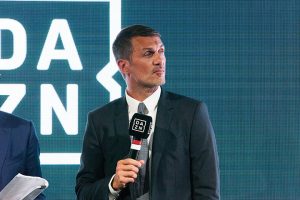Piracy, production and QoS: More details on DAZN’s plans to become the ‘Netflix of sport’
As the live and on-demand sports streaming service DAZN launches in Italy, chief product officer Ben Lavender, in the second part of an exclusive interview with SVG Europe, discusses piracy prevention, production, quality of service (QoS) and service personalisation.
Following last week’s Italian service unveiling, DAZN has been making headlines thanks to the signing of big-name football pundits for its Serie A coverage and the addition of a raft of sports rights to its OTT portfolio.
Read more: DAZN reveals rights line-up and fine-tunes distribution process as Italian service goes live

(L to R) Andriy Shevchenko, presenter Diletta Leotta, Paolo Maldini and Luis Figo at the DAZN Italy launch in Milan
The efforts by the Perform Group-operated service to become the self-proclaimed ‘Netflix of sport’ in Italy, and around the world, don’t begin and end with on-screen footballing royalty or extensive rights deals, however. There are other factors to take into account too.
Combating piracy
To prevent the illegal viewing of its content, DAZN is using a combination of industry-standard digital rights management (DRM) and its own layers of security.
For Apple products, that means Fairplay. For many TV devices and Internet Explorer, it is Microsoft Playready. For Google and Android devices it is Widevine.
“In addition, we use geographic IP detection so that we can block people on a country by country basis,” reveals Lavender.
“We also have a VPN blacklist and we have been watermarking our streams. We feel that we are as covered as we can be.
“It’s just got to work. It’s got to start up fast and it’s got to have low latency. Because the other thing about sports fans is that they may be doing online betting or following a social media pundit [at the same time]. It’s got to be high-quality video without buffering.”
“One of the best ways of [preventing piracy], however, is through access and price. With things like Spotify and Apple Music, having a low monthly cost means that the effort required to pirate [music] is not worth it when you can get a really high-quality stream on any device you want.
“If it’s at a low price, easy and you’ve got access, why bother? It’s worked for music. The same thing will happen for sport.”
Production plans

DAZN chief product officer Ben Lavender will appear at the Sport Production Summit
Plans to produce original non-live content to support its live coverage have also been disclosed in recent days.
While specifics are thin on the ground so far, the first tranche of DAZN’s non-live content will focus on fighting sports, especially for the US, where DAZN has signed big deals with Matchroom Boxing and Bellator MMA ahead of its September launch.
The content types could include documentaries, talk shows and podcasts.
While this is hugely noteworthy and shows a desire to provide a rounded service offering, DAZN is not new to production and already performs host broadcast duties for matches in the UEFA Champions League, the UEFA Europa League and for the J-League in Japan.
The level at which it does its own production, varies from country to country, however. As an example, J League coverage is entirely produced by DAZN. While at the other end of the spectrum, in some territories it takes the NFL live channel and puts it out in full.
Lavender says: “Generally, as a minimum, we take a world feed and then add our own local commentators. In the breaks, we [remove the ads] and promote our own content. For bigger matches, such as the Super Bowl or El Classico, we may add more commentators, pundits and graphics. We have five different tiers of production depending on what it is.”
Adding glamour (and cameras)
By taking over the production of the J-League, DAZN has, as Lavender puts it “changed the face of football”, adding glitz and polish to the coverage, not to mention a huge number of additional cameras.
All J1 games are now covered with a minimum of nine cameras, and include super slow-mo, while Super Sunday matches are enhanced to 16-cameras.
“It used to be comparable to [local TV in the UK] in the 1970s with just four camera angles,” explains Lavender.
“Our investment in the league and the revitalisation of the league is now bringing some of the best players in the world to Japan.”
World Cup winners in the shape of Germany’s Lukas Podolski and Spain’s Andrés Iniesta both now play for the Japanese side Vissel Kobe.
Ensuring service quality

DAZN Italy brand ambassador Paulo Maldini at the Milan launch event
Ahead of the Italy launch, DAZN has put huge efforts into fine-tuning the distribution process to ensure a high quality of service for viewers across Italy.
This was done to cope with the variable quality of broadband coverage across the country. But also to ensure that they put into practice lessons that have been learnt from other territory launches.
“We’ve had some growing pains,” acknowledges Lavender. “But if you look at any high growth company, that is to be expected. In each case, we’ve reacted very quickly. We are incredibly agile and put out updates at least every week or couple of weeks. This solves any issues with scalability or picture quality.”
To ensure DAZN is backed by the best possible technical team to handle such problems, Lavender has hand-picked his staff because, as he admits, “doing OTT is hard.”
“We’re incredibly data-driven. That was drilled into me after four years at Amazon [as principal product manager]. Lots of my Amazon compatriates are on board [at DAZN]. A lot of the people that I am working with, if you look back across [my time with] BBC iPlayer, LoveFilm and Amazon, some of the people I am working with I have known longer than my wife! We have a great team who have been doing VoD for a while.”
“We are incredibly agile and put out updates at least every week or couple of weeks. This solves any issues with scalability or picture quality.”
QoS will be crucial to the success or failure of DAZN, according to Lavender, as sports fans are less tolerant when it comes to buffering and lag.
A streamed TV drama, if affected by networked problems or technical glitches, just hangs and once the problem is solved, the viewer has missed nothing. They can pick up the story from where they left off. But with sport, buffering can mean viewers miss a goal, a wicket or a touchdown.
“It’s just got to work. It’s got to start up fast and it’s got to have low latency. Because the other thing about sports fans is that they may be doing online betting or following a social media pundit [at the same time]. It’s got to be high-quality video without buffering.”
Personalising the experience
Content, distribution and QoS will be important but there are other factors to consider too, he says, citing personalisation.
“We’ve got a whole heap of features coming up on the roadmap to increase personalisation.”
This will include a favouriting feature that will launch shortly, offering alerts for new content.
Perform Group owns the sports data firm OPTA and will be making use of its extensive facts and figures to give viewers the full story of its different sports too, he adds.
DAZN Italy went live on Thursday 2 August with a promise to show 1500 hours of live content each year. Its bouquet of rights includes 114 Serie A matches per season and all 462 Serie B fixtures over the next three years. Pundits for its Serie A coverage will include former footballers Andriy Shevchenko and Luis Figo.
DAZN has also secured the rights to show La Liga, Ligue 1, Ligue 2, Copa Libertadores, Copa Sudamericana, the Africa Cup of Nations and the EFL Cup.
Action from the NHL, MLB, Matchroom Boxing, Showtime Boxing, Bellator MMA, UFC, Heineken Champions Cup and Guinness Pro14 rugby, WRC and PDC Darts will also be available. At the time of writing, discussions were still ongoing with the NFL.
DAZN is currently available in Germany, Austria, Switzerland, Japan, Canada and Italy. It will launch in the USA later this year.
The Perform Group is part of Access Industries, owned by Billionaire Len Blavatnik.
Ben Lavender will be appearing at SVG Europe’s Sport Production Summit in Amsterdam on 13 September. For more details and to register, please go to https://www.svgeurope.org/sport-production-summit-2018/

